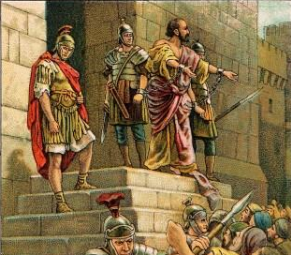Jerusalem’s indictment against Paul
12-11-2016 - Posted by Andre PietNow those who hear glorified God. Besides, they said to him, “You are beholding, brother, how many tens of thousands there are among the Jews who have believed, and all are inherently zealous for the law? Now they were instructed concerning you that you teach all the Jews among the nations apostasy from Moses, telling them not to be circumcising their children, nor yet to be walking in the customs.
Paul’s relationship with Jerusalem was particularly difficult. Also with the Jews that believed Jesus is the Messiah. And make no mistake: there were tens of thousands of them! And all these Jews were zealous for the law. Paul’s reputation amongst them was extraordinarily bad. About Paul it was said that he instructed the Jews abroad not to be circumcised nor to be walking in the customs.
The nations and the law of Moses
The famous assembly of Acts 15 did not give a verdict about this. During that assembly the question whether the nations should keep the law of Moses was dealt with. The unanimous answer to this was that the nations were free and should not be bothered with precepts from the law of Moses. The believers from the nations should only abstain from matters that were forbidden since Adam and Noah: idolatry, adultery, from what is strangled and blood (Acts 21:25). The question during the assembly of Acts 15 was not whether Jews should keep the law, the question was if the nations should do this.
Israel and the law of Moses
Paul’s visit to Jerusalem in Acts 21 was way more sensitive than his earlier visit. In Acts 15 he was criticized by one Jewish group (15:1) because he didn’t preach the law of Moses to the nations. But now the criticism came from all Jews in the land. He was said to teach all Jews among the nations apostasy from Moses. When Paul was informed about this in Jerusalem, the proposed to him to publicly show that this criticism wasn’t true by showing he himself kept the law (21:24). And Paul agrees with this proposal: he goes to the temple and declares a voluntary vow of four men, takes care for the sacrifices that would be made for them and bears their expenses. With this the criticism towards him would be quenched.
Paul taken into custody
But the subsequent events of this history show that this act would not finish the matter. Because when Paul visits the temple a week later and he is recognized by Jews from Asia a big insurgence arose (21:27). The screamed that Paul teaches everyone and everywhere against the nation and the law (21:28). Completely wrong, they also claimed that Paul brought a certain non-Jewish Trofimus in the Temple, with whom he was seen in the city earlier (21:29). Would the latter have been true, it would have meant the death penalty. If the Roman temple police would not have acted, they would have killed Paul (21:31). Paul is taken into custody by the Romans and until the end of the book of Acts this remains his position.
The charge
Now back to the charge against Paul in Acts 21:21. According to his advisors this charge “was nothing” (21:24). And Paul approvingly keeps silent by demonstratively following their advice. But was the charge not true? Didn’t Paul teach that since the resurrection of Christ, Israel was no longer under the law (Gal.3:24)? Indeed, that was what he taught. But never we read that Paul instructed the Jews to no longer circumcise their children or to observe the customs. Moreover, Paul himself remained and lived Jewish (Acts 21:39). He claimed not to have done or taught anything against the “hereditary customs” (Acts 25:8 ; 28:17). That is why he was allowed to speak in synagogues everywhere. Paul didn’t teach that the Jews were not allowed to circumcise their children or to walk according to the customs. He even didn’t teach that it was better not to do this. Paul preached freedom.
Paul taught the freedom of Jew and Greek but absolutely not that Jews were not allowed to circumcise their children or to observe the customs.

 English Blog
English Blog